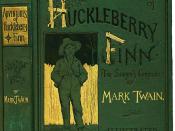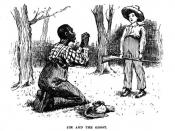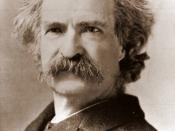Throughout the novel Huckleberry Finn, by Mark Twain, the author points out the injustices and hypocrisy of society and mirrors his views on society with those of Huck. As the reader follows Huck, a young southern boy making an escape from his abusive drunkard of a father, alongside Jim, a runaway slave, he/she views Huck's moral development as he transcends common public opinion of African Americans at the time, part of Twain's comment on society. Twain shows the hypocritical ways of civilized society through the actions of those surrounding Huck and then goes on to display his feelings about society through the actions of Huck. All of this culminates in the antagonist's final decision to reject society and "sivilized" ways and move out west.
The first blow to society that Twain delivers comes early in the book in the form of a court decision. Disregarding what would be in the best interest of the child, the new judge in town grants Pap full rights to his child.
To the reader, this is an absurd decision as it is clear that Pap is only interested in Huck because he believes that Huck has money. Twain also delivers an underlying message in this decision though. To a reader at the time of this novels publication (30 years after the civil war) the moral wrongdoing of granting custody of one man to another would have been overlooked, but in mirroring this situation and granting rights to the immoral Pap over the lovable Huck, Twain forces the reader to look at the meaning of slavery from a more humane standpoint. Twain uses the readers sentiment, as he/she knows what Huck will be forced to endure under Pap's control, to create a sentiment for the troubles of the slaves under the slave-owners.
The next slap in society's face comes much later in the novel when Huck witnesses the shooting of a drunkard for merely shouting insults and the wrong man, Sherburn. A mob then sets out to avenge this cold-blooded murder, but when it arrives at Sherburn's house, he delivers a speech about the cowardice of mobs and the human race in general and the crowd subsides. Although Sherburn's speech clearly reflects Twain's view on mob mentality, Twain's outburst at society is once again found deeper that this. Through the actions of Sherburn, Twain shows that society lacks logic when one man is punished with execution for simple drunken jeers, far more terrible acts go unpunished, such as the abuse of slaves and, after the war, the mistreatment of blacks. Though this may not have been Twain's true intention when he wrote this, one can at least take away that he was speaking out against a lack of logic and an intense selfishness found in society.
Twain's next comment on society, and the overall purpose of the book, focused mainly on Jim's character throughout the course of the novel. Character development throughout portrayed Jim as a noble man with morals, as shown when Jim explains his plan for his life as a free man, to save every sent toward buying freedom for his wife and children. Throughout the majority of the novel, the reader is only exposed to this one side of Jim, the honest, noble Jim who has pride in himself. This makes it seem that Jim is flawless and creates a sort of surreal feeling for the reader. However, in the conclusion of the novel, Twain reveals a long kept secret of Jim's. For a good portion of their trip down the river, Jim knew that Pap had been dead, but he withheld this from Huck possibly believing that if Huck were to know this then there would be nothing keeping him from abandoning Jim and heading back home. Jim could not allow this because he needed Huck to get to freedom. This final discovery shows that Jim is in fact human and has his own needs, which he must cater to just as any human would. This brings Jim to the level of just a man, rather than being placed above all men, and this helps create a hope for equality.
Twain found many flaws in society and he used his writings as a forum to display his feelings toward these injustices. Often Twain's feelings would show themselves in the actions of his characters, and the end of this novel was a fine example of this. As everything in the novel is wrapped up, Huck states that he is going out west because if he stays there Aunt Sally will try to "sivilize" him and Huck finishes out the novel by saying "and I can't stand it. I been there before."


